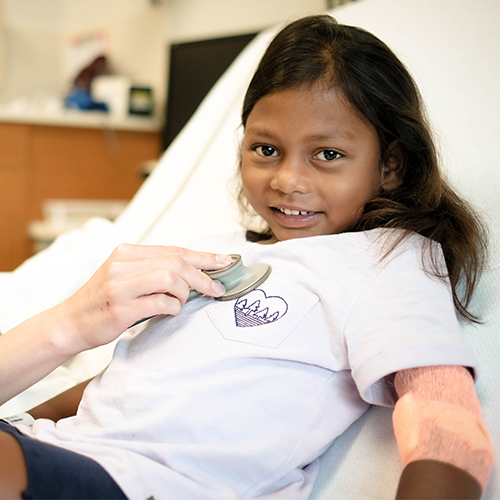You may have heard of children being born with holes in their hearts or kids born with “half a heart,” but did you know? These are all different types of congenital heart defects. A congenital heart defect is a problem in the heart structure that some babies are born with. These defects can range from mild to severe.
Most often, congenital heart defects develop during the early weeks of pregnancy. Some are known to be related to genetic disorders like Down syndrome, but unfortunately, the cause of most heart defects isn’t known.
While heart defects can’t be prevented, there are many treatments available to help kids born with defects and the related health concerns that come with having a heart defect.
How is a heart defect diagnosed?
Newborn screenings
Newborns in the United States are screened during their first 24 hours of life to look for serious health problems. Babies born in Minnesota benefit from one of the most comprehensive newborn screening programs in the country, which tests for serious and rare disorders which may not be visible at birth. One of these tests is a pulse oximetry screening which tests a baby’s blood oxygen level. If the level is low, it can mean that the baby may have a congenital heart defect.
Testing
Additional testing can be done to diagnose a heart defect. After a complete physical exam to check the baby’s heart beat and blood pressure, a cardiologist may complete an electrocardiogram (EKG) or echocardiogram, which is the primary tool used to diagnose a congenital heart defect.
Testing can also be done on a baby before birth. A fetal echocardiogram is a specialized type of ultrasound that can be done as early as 16-18weeks into pregnancy. This testing may be done if a heart abnormality is seen during an ultrasound; if a close family member has a congenital heart defect; or if the mom has a condition, such as diabetes, which may make a heart problem more likely.
What kind of symptoms do heart defects cause?

Some congenital heart defects can cause serious symptoms right at birth. In this case, the baby will go to the cardiovascular intensive care unit (CVICU) for immediate evaluation by a cardiologist. But some defects may not be diagnosed until adolescence, teenage years or even adulthood.
Symptoms
Because congenital heart defects interfere with the heart’s ability to pump blood and deliver oxygen to the body, they can cause a variety of symptoms:
- Bluish lips, tongue and/or nailbeds.
- Increased rate of breathing or trouble breathing.
- Poor appetite or difficulty eating.
- Weight loss or inability to gain weight.
- Abnormal heart murmur.
- Sweating, especially during feedings.
- Weak pulse.
When should I call a doctor?
If you notice any symptoms of a heart defect or suspect that your child may have a heart problem, contact a doctor immediately. If your child suddenly turns very blue or loses consciousness, call 9-1-1.
There are many treatments for congenital heart defects, so the sooner they get medical attention, the quicker they can recover. With all the medical resources available, a congenital heart defect won’t prevent your child from leading a normal life. By working with the health care team, you’ll get the best care possible for your child.
Cardiovascular care at Children’s Minnesota
At Children’s Minnesota we offer leading-edge techniques for treating kids’ heart conditions plus a mega dose of heart in all we do. We provide a full range of cardiology services, from imaging tests to surgeries, from before birth and into young adulthood. With more than 200 professionals from Children’s Minnesota and the Children’s Heart Clinic, we prioritize exceptional care, and our outcomes are some of the best in the country.